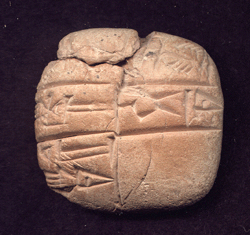Record Keeping and Taxes

Bands and tribal societies have no need for writing, but states do.
States need to keep track of population, taxation and other economic transactions.
Sumerian tax tablet, 2,500 BCE

Bands and tribal societies have no need for writing, but states do.
States need to keep track of population, taxation and other economic transactions.
Sumerian tax tablet, 2,500 BCE
Next: States and the arts
According to the mathematician and author Matt Parker the first named person in history* is Kushim, who was in charge of administering a storage facility containing the basic ingredients for beer production in ancient Sumner more than 5,000 years ago. So, the first person whose name we really know wasn't a king or a prophet, but was basically an accountant. According to Parker, he also made mistakes in arithmetic very much like the ones people commonly make today. So, once again we see that human knowledge has increased. Human intelligence, not so much.
*That is to say, the first name to appear in writing...or the oldest piece of writing that has the name of a person (and, in this case, the person was almost certainly alive at the time of the writing). Accounts of people who may have lived hundreds or thousands of years before they were written about do not count in this analysis. You might, for example, believe that 'Adam' was the first person. But the earliest Hebrew writing is only about 3000 years old and the earliest writing that is part of the Bible is only about 2500 years old. There is no written record of Adam before that. We know the names of Egyptian Pharaohs, but the first of them, Zanakht, lived a good 500 years after Kushim!